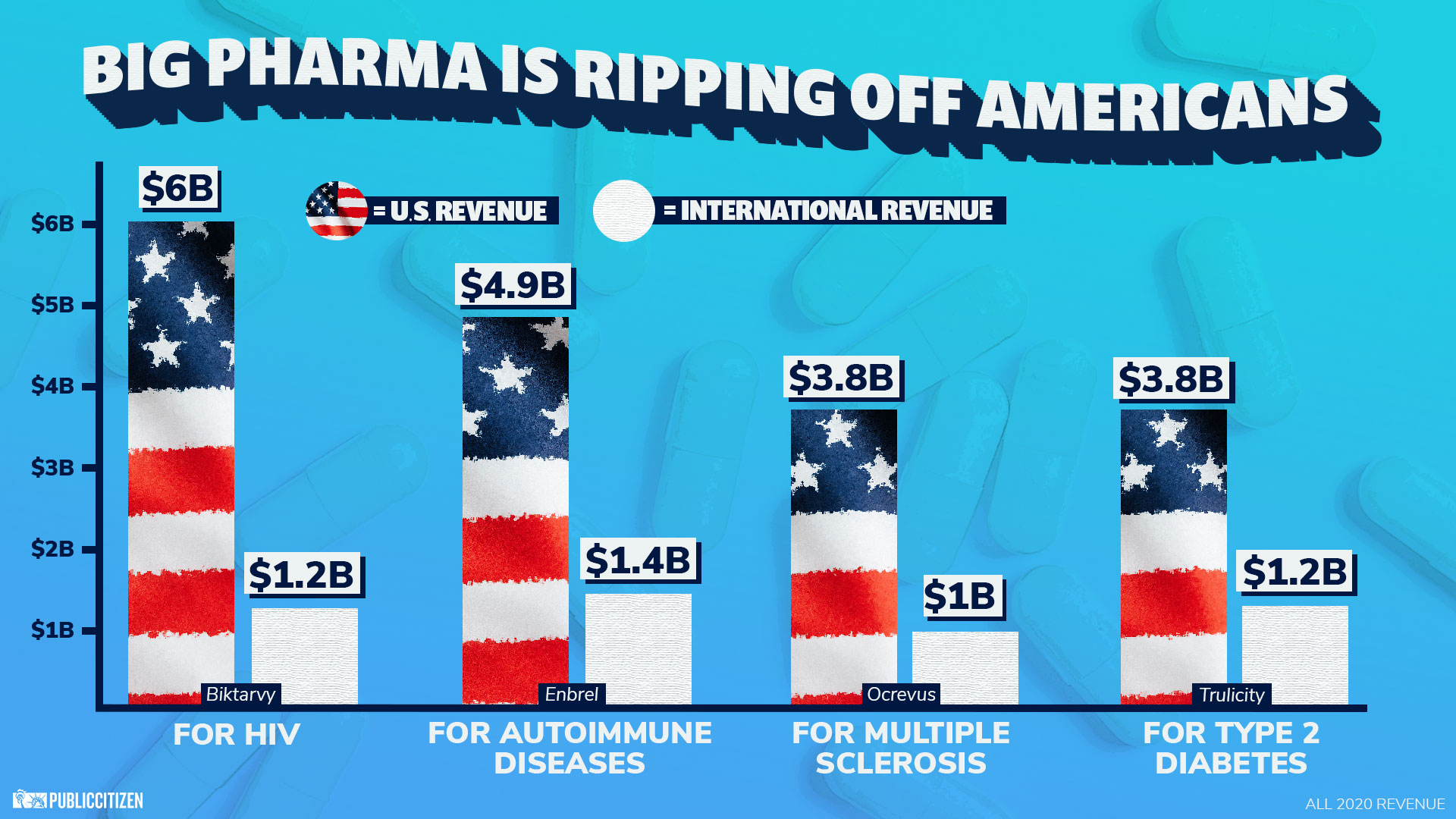Big Pharma Is Ripping Off America
Americans pay Big Pharma more for the top 20 drugs than the rest of the world combined.
By Ava Fitzsimons

Big Pharma greed knows no bounds. Pharmaceutical corporations abuse their monopoly power to rip off Americans en mass. Whatever your political affiliation, background, or zip code, you are harmed by the outrageous prices set by the pharmaceutical companies.
These corporations rake in ridiculous amounts of money from U.S. consumers in comparison to the money they make off all other countries, with Americans spending more per capita for prescription drugs than any other industrialized nation.
In 2020, the combined sales in the U.S. for 17 of the 20 top-selling worldwide drugs generated more money than those same drugs did for the rest of the world combined. U.S. sales of the 20 top-selling drugs totaled $101 billion while the rest of the world’s revenues on these same drugs totaled nearly $57 billion. Basically, the U.S. spent double what the rest of the world did.
The pharmaceutical companies happily reap the benefits of laws that allow them to increase their prices at their discretion. Eleven of the 13 pharmaceutical companies selling these top drugs made more money in the U.S. from those drug sales than they did in the rest of the world combined.
The five drugs with the greatest sales revenue disparities between the U.S. and the rest of the world include: Gilead Sciences’ HIV medication Biktarrvy, AbbVie’s autoimmune disease drug Humira, Eli Lily’s type 2 diabetes drug Trulicity, Roche’s multiple sclerosis drug Ocrevus and Amgen and Pfizer’s autoimmune disease drug Enbrel.
Biktarvy, the HIV medication, received five times more revenue from the U.S. than in the rest of the world. Humira, the autoimmune disease drug, generated four times more revenue in the U.S. than in the rest of the world. Trulicity, the diabetes drug, and Ocrevus, the multiple sclerosis drug and Enbrel, the autoimmune disease drug, got three times more revenue in the U.S. than in the rest of the world.
These enormous disparities hurt American consumers. A new study done by the Commonwealth Fund found that the U.S. health care system ranked last among 11 wealthy countries despite spending the highest percentage of its gross domestic product on health care.
Pharmaceutical companies are taking advantage of people when they need help the most, with no contrition.
How Did We Get Here?
Unlike many other industrialized countries, our laws and regulations allow pharmaceutical manufacturers to set their own prices with little government oversight.
In 2003, President Bush signed a bill into law that created Medicare Part D, but included among its provisions a ban on allowing Medicare to negotiate drug prices. Congress and President Bush created a new guaranteed market for drug corporations to sell their products, protected by government-granted monopolies, and explicitly prohibited price negotiation. Industry predictably began jacking up prices.
In response to the industry charging ever-higher prices for drugs old and new, there has been overwhelming public support for anti-price-gouging legislation. So, why has it stalled in Congress every time? Because the pharmaceutical industry has influence over politicians on both sides. Since 2008, the industry has spent $2.7 billion on lobbying in Washington, contributing 44 percent to Congressional Republicans and 56 percent to Congressional Democrats.
Congress now has the chance to fight back. Granting Medicare the authority to negotiate drug prices and push back against Big Pharma company profiteering would mean an end to decades of overpaying for medicines and yield hundreds of billions in cost-savings that could be used to improve and expand health care coverage. In short, bold drug pricing reform would support a healthier America.
Now, Big Pharma is pushing a disinformation campaign to scare Americans away from the solution. Deceptive ads were created to mislead Americans into thinking the plan would impede on drug research and what medicines Americans can have access to. “Politicians say they want to negotiate medicine prices in Medicare,” the new ad states. “But make no mistake: What politicians mean is they’ll decide which medicines you can and can’t get.”
In reality, there’s nothing in the proposal that would allow the government to decide which medications people on Medicare can get. Furthermore, drug manufacturers set prices to maximize profits, not to cover research and development costs. Government-funded research provides the scientific foundation for the development of new drugs by private industry.
The drug-price plan in the reconciliation package is one of our most important tools for stopping greedy pharmaceutical companies from capitalizing on vulnerable Americans. The proposed plan would give Medicare bargaining power to drive down U.S. drug prices. However, Big Pharma has flooded Congress with corporate cash and the media with a false narrative in an effort to stop it from passing. Their substantial donations are made with the intentions of keeping Big Pharma profits untouched.
It is time to call out Big Pharma and the paid out politicians’ on their ulterior motives. Big Pharma drug prices exemplify the culture of corruption in which special interests advance their interests at the expense of everyday Americans. Congress must enact a robust system of direct government drug price negotiation and price spike protections for people across America now.